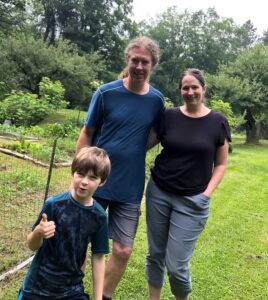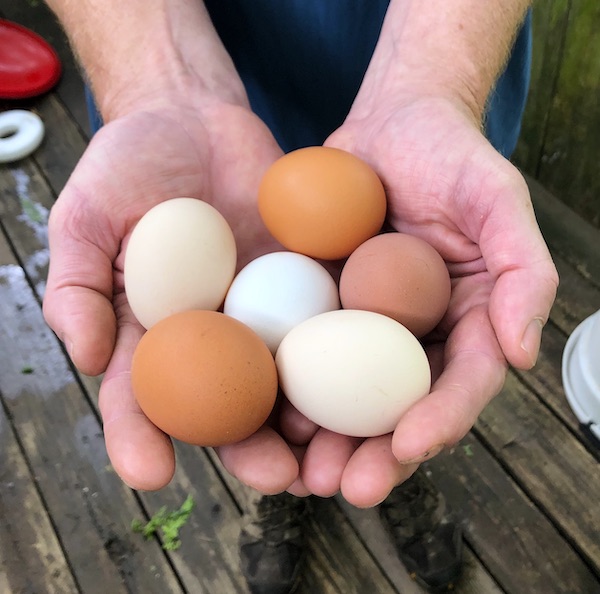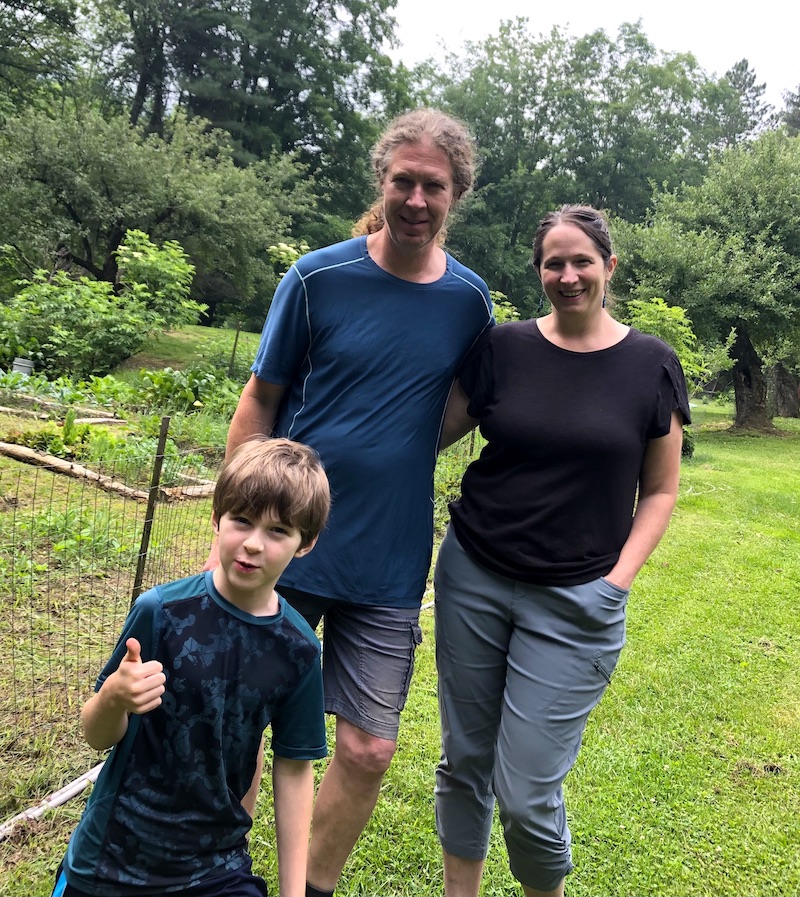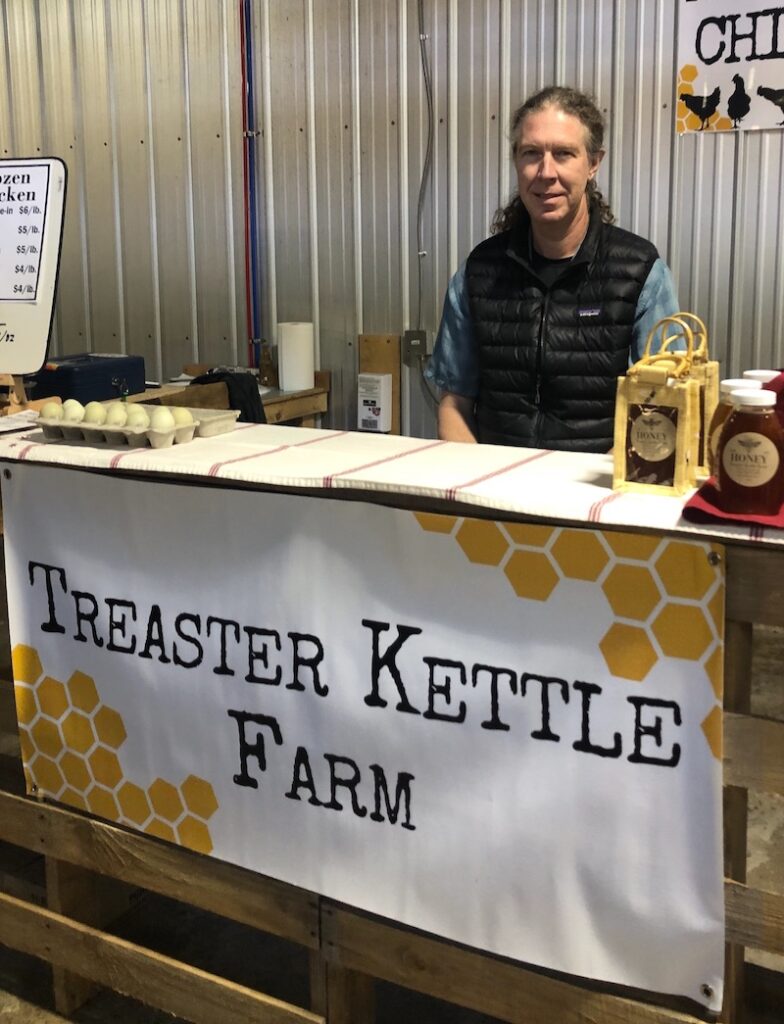
Joseph Griffin believed he would someday return to his boyhood home on 14 acres. But then he found new stewards and preserved the land.
For decades, Joseph Griffin believed he would return to his cherished boyhood home and live in the little log house on 14 acres of sloping field and forest next to the Treaster Kettle CCC Camp and a mile from Colyer Lake in Potter Township.
Instead, in 2015, he chose a different peace of mind when he made a decision about the future of his land.
Griffin donated an agricultural conservation easement to the Centre County Farmland Trust and sold the land to a young family who share his land conservation ethic.
Jack Ray and Sarah Decker have carved out a farm life and vision to produce a harvest in harmony with the land and forest.
A Shared Vision of Harmony with Land
Ray and Decker operate the Treaster Kettle Farm. They raise chickens, vegetables and honeybees on a few cleared acres. On the 12 wooded acres, Ray “farms the forest” by cultivating mushrooms and tapping the sugar maples. Farm products include honey and beeswax candles, eggs and chickens, wild and cultivated mushrooms and maple syrup.
“What I see when I walk through these woods are the mature oaks and mature maples and because they’re mature I get these wonderful mushrooms,” says Jack Ray. “An acre of woods, in my opinion, can produce more than an acre of field while still serving as part of the ecosystem.”
The wild mushrooms foraged on the woodland include chanterelle, trumpet, oyster, chicken of the woods, maitake, morels and lion’s mane. He also grows shitake mushrooms on logs outdoors.
A Boy’s Paradise

At the time of the sale and easement, new owners Jack Ray and Sarah Decker were expecting their son, Sam — who is now so close in age to Griffin’s when his family first moved to this clearing in the woods that Griffin affectionately calls Sam his “replacement.”
Griffin, now nearly 80, was eight years old when his father bought the land and moved the family to the little house with asphalt siding and an outhouse — but no electricity or telephone service — and decided to commute to his job in town working for Penn State Extension. Griffin is not sure what prompted his dad to do so, but quickly became enchanted with a spot he describes as “a rural paradise” and “truly bucolic existence.”
He remembers lilacs, butterflies, a wild turkey sleeping on the smokehouse roof and the night music of an Eastern Whip-poor-will perched outside his open bedroom window.
“You could just hear the rumbling in the bird’s throat,” said Griffin. “I swear it was eight feet away.”
Securing Land’s Highest Value
Then, his father got a new job at General Electric and the family moved to Greenwich, Connecticut.
Years later, they returned, and Griffin lived there during his years as a high school student and through his college studies at Penn State. He moved to a place in town for graduate school. His parents lived at the homestead until their deaths.
Griffin married in grad school. Following graduation, he and his wife began their academic careers in Massachusetts. After serving as Dean of the College at Unity College in Maine, he began following his wife, Dr. MaryAnn Griffin, to where her career took her. First, that was Cincinnati and later Philadelphia, where she served as Director of Flakey Memorial Library at Villanova University from 1984 to 1995.
Looking for a respite from city life, the couple bought a 1700s farmhouse on 26 acres in Oley, Pa., with a back porch view of a covered bridge and had many wonderful, happy years there until MaryAnn died in 1995 of an aggressive form of breast cancer within six months of diagnosis. They had no children.
Griffin started an organic farm operation on the land and ran it for “10 glorious years” until the operation ran into labor issues and collapsed.
Ultimately, Griffin preserved the Oley farmland, selling the development rights through the Berks County Agricultural Conservation Easement Program.
“I like the land and the highest value to me was seeing it not destroyed by houses,” says Griffin.
‘Messy & Joyous’
Jack Ray and Sarah Decker rented the log cabin house from Griffin in 2006, knowing Griffin intended to retire to the farm.
But then — Griffin visited Jack and Sarah at the farm and witnessed what he calls the “slightly messy, joyous existence” of farm life. Friends were visiting. Dogs were running around.
“It seemed like the place would be better served with them there,” says Griffin, who could not afford to maintain the property but feared selling it would lead to its subdivision for suburban-style house lots. He approached the Farmland Trust about donating a conservation easement, and decided to sell.
The timing was ideal, as Ray and Decker were expecting their son and looking to purchase a property. Ray and Decker had dreamed up a vision of their own for the farm.
All three share a similar life philosophy and land ethic. Ray, the son of wildlife biologists, had been co-director of Penn State’s Institute for Sustainability and was familiar with conservation easements and preservation of agricultural lands.
“That was really greatly appreciated on our side and a great opportunity,” says Ray, of Griffin’s invitation into the easement process as the new owners.
Often, says Griffin, people are drawn to the country, move then subdue the land with a huge, manicured lawn and paved driveway — which is not what Griffin envisioned for his boyhood home. Ray and Decker are, instead, responding to the land.
“They’re vibrating in tone with the land. They’re resonating with the land,” says Griffin.




